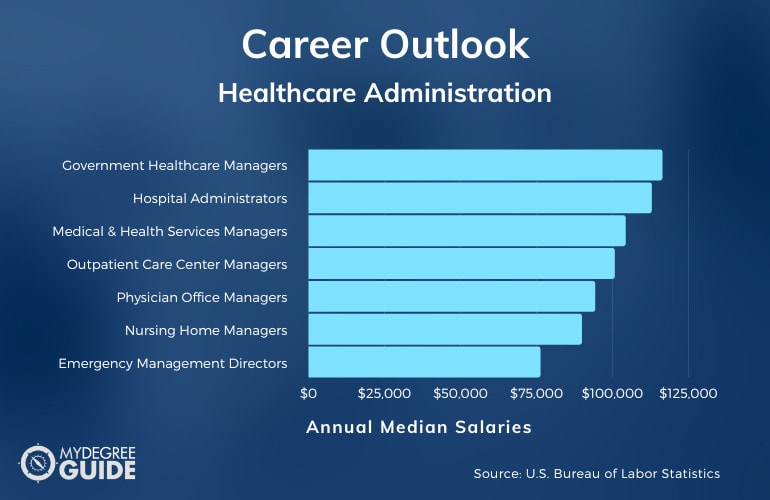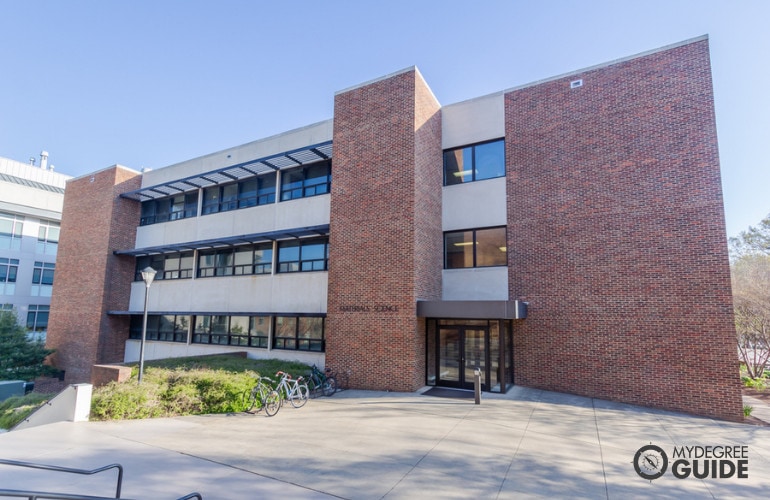Accelerated healthcare administration programs can help set you up for a high-demand career. Healthcare administration is one of the fastest-growing occupational fields, with the Bureau of Labor Statistics estimating there will be about 133,200 new jobs over the course of the next 10 years.

As a healthcare administrator, you may get to skip the night shifts and other downsides of the job that a doctor, nurse, or health aide deals with. You can still help people, but you’ll likely be spending your days coordinating health services in nursing homes, hospitals, or clinics.
Healthcare administrators keep everybody else on track. In this position, you will likely focus on budgeting, scheduling, public education, and ways to improve patient care.
Editorial Listing ShortCode:
Business Insider reported, “By 2030, every Baby Boomer will be age 65 or older,” so 1 out of every 5 Americans will be of retirement age by then. Millions of people will be needing healthcare. This career field is not one that is likely to slow down anytime soon.
As a result, there are not only thousands of jobs available but hefty paychecks too. The average salary for a health service manager is $104,280.
List of Schools Offering Accelerated Healthcare Administration Programs Online
Methodology: The following school list is in alphabetical order. To be included, a college or university must be regionally accredited, offer degree programs online or in a hybrid format, and have accelerated classes that are 8 weeks or less in duration.
1. American College of Education
American College of Education offers a Bachelor of Science in Healthcare Administration. The program is designed for students looking to complete their degrees while actively working in the healthcare profession. This program’s online format and accelerated pace aims to provide flexibility. Most students can complete the program in just 20 months.
The American College of Education is accredited by the Higher Learning Commission of the North Central Association.
2. Arizona State University
Arizona State University offers an online Bachelor of Science in Healthcare Coordination program. The courses in this program are designed to take 7.5 weeks to complete, with each term split into two sections. There are 40 classes required for the major and a total of 120 credits hours required to graduate.
ASU is accredited by the Higher Learning Commission of the North Central Association of Colleges and Schools.
3. Champlain College
Champlain College offers an online Bachelor’s in Healthcare Administration. There are 3 semesters per year, each broken up into two, 7 week terms. Students must obtain 120 credits to graduate. Students may transfer up to 90 credits from other institutions. They also offer a Healthcare Administration specialization certificate for 15 credit hours.
Champlain College is accredited by the New England Commission of Higher Education.
4. Charter Oak State College
Charter Oak State College offers an online Bachelor’s in Healthcare Administration for adults interested in completing their degrees online. A minimum of 42 credits is required to complete the program. Students interested in the program may choose from 6 different start dates.
Charter Oak State College is accredited by the New England Commission of Higher Education.
5. College of Saint Scholastica
College of Saint Scholastica offers a Bachelor of Arts in Management with a Healthcare Administration concentration. The program can usually be completed in 3 years, with 128 credits required for graduation. To obtain this degree, 14 mandatory courses and 12 courses from upper-division management classes are required.
The College of St. Scholastica is accredited by the Higher Learning Commission.
6. Colorado State University
Colorado State University offers an online Bachelor’s in Healthcare Administration with optional degree specializations or certificates.
Some options are Organizational Leadership, Project Management, and Emergency Management. They also offer a dual enrollment option. This option allows students interested in getting a Master of Healthcare Administration to take 3 graduate-level courses, allowing 9 credits to be applied to both degrees.
Colorado State is accredited by the Higher Learning Commission.
7. Concordia University – Chicago
Concordia University—Chicago offers an online Bachelor of Arts in Healthcare Management. To graduate, students must acquire 128 credit hours. Of these, 48 are general credit requirements. A maximum of 67 credits may be transferred, potentially allowing half of the degree to be completed at the start of the program.
Concordia University Chicago is accredited by the Higher Learning Commission.
8. Dallas Baptist University
Dallas Baptist University offers an online Bachelor of Arts and Science in Healthcare Administration. To graduate, students are required to achieve 120 credit hours, with 30 credits tied to the major and 43 from electives. At least 42 credit hours must be from upper-level courses.
Dallas Baptist University is accredited by the Southern Association of Colleges and Schools Commission on Colleges.
9. Drexel University
Drexel University offers an online Bachelor of Science in Health Services Administration. Students need 180 credits to graduate. These can be obtained from one of three different study plans offered by the school: a 4 year program with no co-op, a 4 year program with one co-op, or a 5 year program with three co-ops.
Drexel University is accredited by the Middle States Commission on Higher Education.
10. East Carolina University
East Carolina University offers an online Bachelor of Science in Health Service and Information Management with two different education paths to fit students’ backgrounds.
Students with work experience or with associate degrees can typically finish the program in 2 years, while students with no experience can usually complete the program in 4 years.
East Carolina University is accredited by the Southern Association of Colleges and Schools Commission on Colleges.
11. Florida Institute of Technology
Florida Institute of Technology offers an online Bachelor of Science in Healthcare Administration with a specialization in Healthcare Management. Students must acquire 121 courses to graduate, with 26 required for the major, 2 electives, and 15 general education courses. Terms at the Florida Institute of Technology last for 8 weeks.
Florida Institute of Technology is accredited by the Southern Association of Colleges and Schools Commission on Colleges.
12. Grand Canyon University
Grand Canyon University offers an online Bachelor of Science in Healthcare Administration program.
Courses in this program run for 7 weeks, and a total of 120 credits are required to graduate, with 56 credits being related to the major. Students may transfer up to 90 qualifying credits for the degree, with only 84 credits allowed from lower-division courses.
Grand Canyon University is accredited by the Higher Learning Commission.
13. King University
King University offers an online Bachelor of Science in Healthcare Administration. The program is designed for those who wish to finish their degrees or medical professionals looking to transfer to management positions.
Courses in this program run for 5 weeks, and the program can usually be completed in 16 months. To graduate, students must complete 124 semester hours, with 48 hours related to the major and 38 to electives.
King University is accredited by the Southern Association of Colleges and Schools Commission on Colleges.
14. Liberty University
Liberty University offers an online Bachelor’s in Healthcare Administration. The program typically takes 3.5 years to complete, with courses lasting 8 weeks. Students are required to have 120 credit hours to graduate and have the option to transfer in up to 90 qualifying credits. The program also allows for students to take on internships.
Liberty University is accredited by the Southern Association of Colleges and Schools Commission on Colleges.
15. Mercy College of Ohio
Mercy College of Ohio offers an online Bachelor’s in Healthcare Administration. The program can usually be completed in 5 semesters. Students may also choose to join the MHA fast track program.
Students who wish to receive both a bachelor’s and master’s degree in Healthcare Administration may take 1 to 6 courses at the 500 level that go toward both degrees.
Mercy College of Ohio is accredited by the Higher Learning Commission.
16. Midway University
Midway University offers an online Bachelor of Science in Healthcare Administration. To graduate, students must complete 120 credit hours, with up to 24 elective hours. Students who have previous experience in the field through work experience or past education may obtain up to 21 credit hours toward their major course requirements.
Midway University is accredited by SACSCOC.
17. Nebraska Methodist College
Nebraska Methodist College offers an online Bachelor of Science in Healthcare Management. The program can typically be completed in 4 years, or 8 semesters.
Students need 120 credit hours to graduate. After graduating, students may choose to transition immediately to the Master of Science in Healthcare Management program offered by Nebraska Methodist College.
Nebraska Methodist College is accredited by the Higher Learning Commission.
18. Old Dominion University
Old Dominion University offers an online Bachelor of Science in Health Science. There is a prerequisite of 12 credit hours required to apply for the program. To graduate, students must complete 120 total credit hours. At least 30 credit hours must be completed at Old Dominion University.
Old Dominion University is accredited by the Southern Association of Colleges and Schools Commission on Colleges.
19. Ottawa University
Ottawa University offers an online Bachelor’s in Healthcare Management program with two separate tracks.
Students with at least 30 credits in professional clinical training may join the Clinical Track. Those who don’t have this training can join the Non-Clinical Track. On the Clinical Track, students may apply a maximum of 80 credit hours toward their degree.
Ottawa University is accredited by the Higher Learning Commission.
20. Park University
Park University offers online a Bachelor of Science in Business Administration Health Care, a Bachelor of Science in Management and Health Care, and a Masters of Health Care Administration.
Each course in these programs runs for 8 weeks. The master’s degree program offers multiple concentrations, including Project Management and Global Business.
Park University is accredited by the Higher Learning Commission.
21. Purdue University
Purdue University offers an online Bachelor’s in Healthcare Administration. Terms in this program run for 10 weeks.
To graduate, students must acquire 180 credits. Purdue offers a service called ExcelTrack, which allows students to take as many 1 credit courses in a term as they wish, allowing them to complete the degree at their own pace.
Purdue University is accredited by the Higher Learning Commission of the North Central Association of Colleges and Schools.
22. Regis University
Regis University offers an online Bachelor of Science in Healthcare Administration. Terms last for 8 weeks, and students may choose to start the program in January, May, or August. To graduate, students must achieve 120 credit hours. Students may be allowed to transfer up to 78 credit hours.
Regis University is accredited by the Higher Learning Commission.
23. Saint Joseph’s College of Maine
Saint Joseph College of Maine offers an online Bachelor of Science in Health Administration program. The program typically takes 4 years to complete.
To graduate, students must complete 120 credit hours. Students may apply to the fast-track program, which allows students to take graduate-level courses and apply them to both a bachelor’s degree and a master’s degree.
Saint Joseph’s College is accredited by the New England Commission on Higher Education, Inc.
24. Saint Leo University
Saint Leo University offers a Bachelor of Science in Healthcare Administration. To graduate, students must complete 120 credits, with 30 credit hours needed for the major and 36 general credit hours. For students not working in the industry, an internship worth 3 to 12 credits is required during their senior year.
Saint Leo University is accredited by the Southern Association of Colleges and Schools Commission on Colleges.
25. Southern New Hampshire University
Southern New Hampshire University offers an online Bachelor of Science in Health Service Administration.
Students must complete 120 credits and may be able to transfer in up to 90 credits. The online degrees offered by Southern New Hampshire University require the completion of general education classes. The program allows a concentration in either Health Information Management or Patient Safety & Quality.
Southern New Hampshire University is accredited by the New England Commission of Higher Education.
26. University of Central Florida
The University of Central Florida offers an online Bachelor of Science in Health Services Administration to students who are transferring into UCF from another institution. To graduate, students must complete 120 credit hours. The program can usually be completed in 2 to 4 years, depending on the number of credits transferred over.
The University of Central Florida is accredited by the Southern Association of Colleges and Schools Commission on Colleges.
27. University of Minnesota – Crookston
The University of Minnesota—Crookston offers an online Bachelor of Science in Healthcare Management. To be accepted into the program, at least 45 credits must be completed.
To graduate, students must complete 120 credits, including at least 13 credits in electives and 64 credits related to the major. Up to 8 credits may be transferred from an accredited program to count toward this degree.
The University of Minnesota – Crookston is accredited by the Higher Learning Commission.
28. University of Saint Francis
The University of St. Francis offers an online Bachelor of Business Administration in Healthcare Management. Students also interested in obtaining either an MBA or an M.S degree may take graduate-level courses in their last two semesters. This may allow them to acquire their master’s within a year after they received their bachelor’s.
The University of Saint Francis is accredited by the Higher Learning Commission.
29. University of Virginia
The University of Virginia offers an online Bachelor of Professional Studies in Health Sciences Management.
The program is designed for those who have either started their degrees or have an approved Allied Healthcare Associate’s Degree. While students may transfer credits in, at least 60 credits of the 120 needed for the bachelor’s degree must be earned from the University of Virginia.
The University of Virginia is accredited by the Commission on Colleges of the Southern Association of Colleges and Schools.
30. University of West Florida
The University of West Florida offers an online Bachelor of Science in Health Science—Healthcare Administration program. Courses run for 8 weeks, and the program can usually be completed in 48 months. Students must complete 120 credit hours to graduate and may transfer in up to 90 qualifying credits. An internship is required to graduate.
The University of West Florida is accredited by the Southern Association of Colleges and Schools Commission on Colleges.
What Degree Is Needed for Healthcare Administration?
A healthcare administration online degree program or traditional degree program can help set you on the path to a career in allied health, medicine, public health, public administration, or business administration. You may even tailor your degree to your career goals by choosing one of these concentrations:
- Education
- Gerontology
- Information Systems
- Management
- Financial Management
- Law and Policy
- Patient Safety and Quality
- Public Relations and Media Management
Any of these specializations can help you prepare for an in-demand and rewarding career.
Accelerated Health Care Administration Degree Programs Overview

A health care administration degree program may not only prepare you with classes but may also include an internship. This double whammy preparation can help you graduate with both a degree and experience in the field.
Classes vary from program to program, but many healthcare administration degree programs have similar classes. Some possible classes are:
- Community Health
- Contemporary Issues in Healthcare Management
- Critical Incident Management
- Disaster Planning and Response
- Emergency Management and Homeland Security
- Healthcare Financial Management
- Healthcare Laws and Ethics
- Healthcare Management Terminology
- Healthcare Outcomes and Quality Management
- Health Informatics
- Legal Aspects of Healthcare Management
Earning this degree requires more than just book knowledge. Many of your classes will likely ask you to dive into the hands-on skills you’ll need to handle situations that come up in healthcare.
What Can I Do with a Bachelor’s Degree in Healthcare Administration?

Many healthcare careers come with not only a rewarding role but also a satisfying salary. According to the Bureau of Labor Statistics, some careers in the healthcare administration field and their average salaries are:
| Career | Annual Median Salary |
| Government Healthcare Managers | $116,380 |
| Hospital Administrators | $112,870 |
| Medical and Health Services Managers | $104,280 |
| Outpatient Care Center Managers | $100,690 |
| Physician Office Managers | $94,240 |
| Nursing Home Managers | $89,880 |
| Emergency Management Directors | $76,250 |
Any one of these professions may require you to use your skills in organization and communication to manage the business side of healthcare. This is such a necessary role that there is a 32% growth rate expected for healthcare administration careers.
As more people age, there is an increased need for healthcare services. In addition, pursuing a master’s or even a PhD in Healthcare Administration could help make your salary potential even higher.
The Advantages of Online Accelerated Healthcare Administration Programs

Accelerated programs often provide a lot of flexibility and enable students to customize their degree plans to better suit their goals and needs. There are many benefits to choosing to take accelerated online courses instead of traditional, on-campus classes.
Start Sooner
Many post-secondary institutions offer start dates each month. With these programs, there is no need to wait (or rush to be ready) for a September start date. You can start when it works for you.
Study When and Where You Want
Many online courses do not require you to meet at a set time. You may complete your studies when and where you want to. You also don’t need to move or commute to attend your classes.
Finish Faster
Traditional classes are about 16 weeks long. In accelerated courses, you may be able to learn the same information and earn the same credits in just 5, 6, or 8 weeks.
If you’re self-motivated, online accelerated classes can potentially allow you to finish your degree in half the time.
3 Ways to Accelerate Your Healthcare Administration Degree Even More

Aside from taking accelerated courses, you may be able to shorten the time it takes to earn your degree even further. With these tips, you could potentially earn your bachelor’s degree in just two years or less.
Test Out of Classes by Taking CLEP Tests
Many schools will allow you to apply credits earned from CLEP (College Level Examination Program) tests to your degree.
With the College Level Examination Program, you pay $89 per test, plus any other fees required by the testing center. If you get at least 50% of the questions right, you earn credits, usually 3, for that course. You can earn up to 30 credits like this.
Submit a Prior Learning Portfolio
Many schools will allow you to submit a prior learning portfolio to earn credit for job and military training and experiences you have. You can potentially earn up to 15 credits for proving that you already know the class material due to these experiences.
Take a Full Course Load Each Semester
Instead of taking the traditional 30 credit hours most students take per year, many schools will allow you to take 18 credits per semester, including the summer, for a total of 54 credits. This can help you finish your degree up to two years earlier.
If you earn 30 credits from CLEP tests, 15 credits through Credit for Prior Learning, and then work hard earning 18 credits each semester, you could potentially have 120 credits in just 18 months! That’s potentially your full bachelor’s degree program completed in less than 2 years.
You may also be able to transfer any existing college credits you already have. If you passed a class from an accredited college with at least a C grade, it might transfer into your healthcare administration degree program. Even if you can’t match the class specifically to your healthcare degree courses, you may be able to use the credit as an elective to avoid taking an extra class!
How to Lower Your Tuition Costs

Credit by Exam and Credit for Prior Learning may cut down your tuition bill by allowing you to skip some core classes. You may also bring your overall bill down by applying for financial aid.
Here are some places to look:
- FAFSA (Free Application for Federal Student Aid): grants, loans, work-study funds
- State government: grants
- Private organizations: merit scholarships
- Universities: incentive scholarships
- Employers: tuition assistance or reimbursement
If you spend some time researching the opportunities available, you could potentially end up spending much less on your college education.
Healthcare Administration Degree Accreditation

It is very important to make sure that your school has regional accreditation. If your school doesn’t have regional accreditation, there is no guarantee that it won’t be a waste of your time and money.
Regional accreditation is a stamp of approval that proves to future employers, graduate schools, and certifying programs that your degree is legitimate. It shows that your school has gone through the measures needed to prove that they are meeting standards of education.
You can also look for programmatic accreditation to ensure that your program is meeting the standards for your field of study.
For healthcare administration programs, you can look for accreditation from one of these boards:
- Commission on the Accreditation of Healthcare Management Education (CAHME)
- American College of Health Care Administrators (ACHCA)
- American College of Health Care Executives (ACHE)
- American Health Information Management Association (AHIMA)
- National Association of Long-Term Care Administrator Boards and Catholic Health Association
- The Association of University Programs in Health Administration (AUPHA)
A properly accredited degree can help set you on the path for an amazing career in health care.
How Long Does It Take to Get a Healthcare Administration Degree?

Most on-campus healthcare administration degree programs take 4 years to complete. Online degree programs are typically geared more toward adult learners and are designed to be flexible.
You might take classes one at a time and slowly complete your degree or fast-track the process and potentially finish in 2 or 3 years. If those options are still too long of a commitment, an online associate’s degree in healthcare administration may be a better fit.
What Is the Best Online School for Healthcare Administration?
It depends on which school suits you best, but it is always wise to look for an online school for healthcare administration that offers your degree concentration and is accredited. Proper accreditation from a regional body or a program-specific accreditation board is a sign of high-quality education.
What Next?

Is the thought of a career that is anticipating a 32% growth rate tempting? The field of healthcare management is growing faster than the average of all other occupations.
To get started, here’s what you can do next:
- Decide on your concentration (if any) and narrow down your choice of schools.
- Apply to 5-10 universities to better your chances of being accepted by a few schools, and then take your pick of which to attend.
- Research and apply for financial aid to potentially lower your costs and make it easier to complete your degree quickly.
Once you enroll, if you apply the tips you’ve read here, you could potentially be finished in just two years and on your way to a career field with exploding possibilities and average salaries of $76,000-$116,000 a year (Bureau of Labor Statistics).
